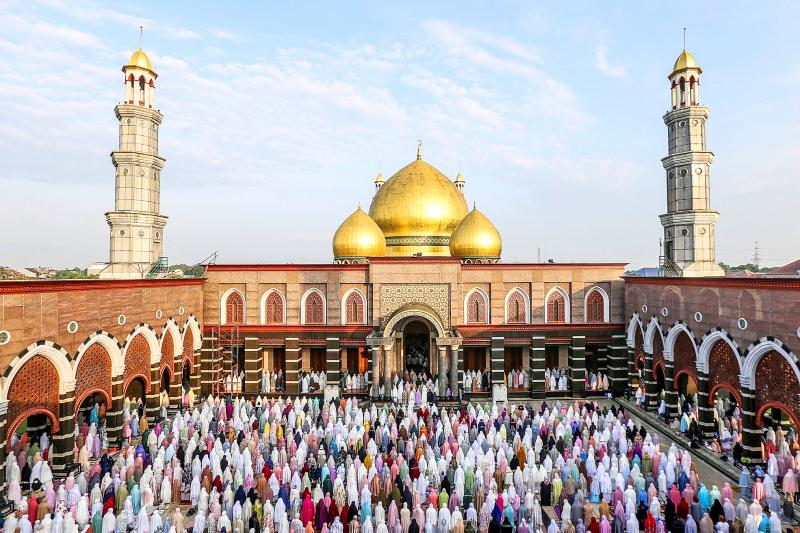Millions of Muslims in Indonesia yesterday returned home to properly celebrate Eid al-Fitr after two years of subdued festivities due to COVID-19 restrictions and travel curbs.
Eid al-Fitr marks the end of the Islamic holy month of Ramadan, when the faithful fast from dawn to dusk.
The return of the Eid tradition of homecoming has caused great excitement for people in the world’s most populous Muslim-majority country, as family gatherings and meet-ups with friends were on people’s lists while shoppers flocked to shopping centers despite surges in food prices.

Photo: Antara Foto / Asprilla Dwi Adha / via Reuters
In the past week, millions of Indonesians have crammed into trains, ferries, buses and — in greater numbers than ever — motorcycles, as they poured out of major cities to return to their villages to celebrate the holiday with families amid severe traffic congestion starting to occur on major thoroughfares across the country.
Flights were overbooked and anxious relatives weighed down with boxes of gifts formed long lines at bus stations for journeys that can take days.
The annual exodus tradition, known locally as “mudik,” returned this year after Indonesian President Joko Widodo surprisingly announced last month that the government decided to ease restrictions for the holiday festivities for the first time since they were banned two years ago due to COVID-19.
The country had largely recovered from a third wave of COVID-19 infections as a surge driven by the Omicron variant of SARS-CoV-2 peaked at about 64,700 daily cases in the middle of February. New daily infections had fallen to about 200 by this month, and about 80 percent of Indonesia’s eligible population of 208.2 million people had been fully vaccinated as of Sunday.
The government estimated that about 85 million travelers were expected to crisscross the vast archipelago that spans 17,000 islands for Eid al-Fitr this year, with about 14 million travelers departing from Jakarta’s greater metropolitan area. This is significantly higher than before the COVID-19 pandemic, when about 30 million people participated in the annual exodus tradition.
Worshipers wearing masks joined communal prayers shoulder-to-shoulder without physical distancing in the streets of Jakarta and in mosques across the city.
In Jakarta’s Istiqlal Grand Mosque, the largest in Southeast Asia, tens of thousands of Muslims attend prayers after authorities shuttered the mosque in 2020, when Islam’s holiest period coincided with the start of the pandemic. The Istiqlal mosque was totally closed during 2020 and last year remained closed for congregational prayers.
“Words can’t describe how happy I am today. After two years we were separated by pandemic, today we can do Eid prayer together again,” said Epi Tanjung, a Jakarta resident.
“Hopefully all of these will make us more faithful,” he said after worshiping with his wife at Jakarta’s al-Azhar Mosque where Muslims were seen embracing one another after prayers.

POLITICAL PRISONERS VS DEPORTEES: Venezuela’s prosecutor’s office slammed the call by El Salvador’s leader, accusing him of crimes against humanity Salvadoran President Nayib Bukele on Sunday proposed carrying out a prisoner swap with Venezuela, suggesting he would exchange Venezuelan deportees from the US his government has kept imprisoned for what he called “political prisoners” in Venezuela. In a post on X, directed at Venezuelan President Nicolas Maduro, Bukele listed off a number of family members of high-level opposition figures in Venezuela, journalists and activists detained during the South American government’s electoral crackdown last year. “The only reason they are imprisoned is for having opposed you and your electoral fraud,” he wrote to Maduro. “However, I want to propose a humanitarian agreement that

ECONOMIC WORRIES: The ruling PAP faces voters amid concerns that the city-state faces the possibility of a recession and job losses amid Washington’s tariffs Singapore yesterday finalized contestants for its general election on Saturday next week, with the ruling People’s Action Party (PAP) fielding 32 new candidates in the biggest refresh of the party that has ruled the city-state since independence in 1965. The move follows a pledge by Singaporean Prime Minister Lawrence Wong (黃循財), who took office last year and assumed the PAP leadership, to “bring in new blood, new ideas and new energy” to steer the country of 6 million people. His latest shake-up beats that of predecessors Lee Hsien Loong (李顯龍) and Goh Chok Tong (吳作棟), who replaced 24 and 11 politicians respectively

Young women standing idly around a park in Tokyo’s west suggest that a giant statue of Godzilla is not the only attraction for a record number of foreign tourists. Their faces lit by the cold glow of their phones, the women lining Okubo Park are evidence that sex tourism has developed as a dark flipside to the bustling Kabukicho nightlife district. Increasing numbers of foreign men are flocking to the area after seeing videos on social media. One of the women said that the area near Kabukicho, where Godzilla rumbles and belches smoke atop a cinema, has become a “real

‘POINT OF NO RETURN’: The Caribbean nation needs increased international funding and support for a multinational force to help police tackle expanding gang violence The top UN official in Haiti on Monday sounded an alarm to the UN Security Council that escalating gang violence is liable to lead the Caribbean nation to “a point of no return.” Special Representative of the UN Secretary-General for Haiti Maria Isabel Salvador said that “Haiti could face total chaos” without increased funding and support for the operation of the Kenya-led multinational force helping Haiti’s police to tackle the gangs’ expanding violence into areas beyond the capital, Port-Au-Prince. Most recently, gangs seized the city of Mirebalais in central Haiti, and during the attack more than 500 prisoners were freed, she said.